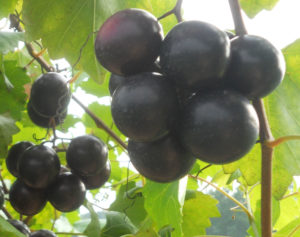
In 2015, Wake Forest Baptist Medical Center received an anonymous $20 million donation to study the effects of a proprietary muscadine grape extract (MGE) on prostate and breast cancers. The gift is the largest ever received by the Medical Center. The 5-year research study involves 26 faculty members from multiple disciplines, including hypertension and vascular research, hematology and oncology, cancer biology, urology, radiology, public health sciences, radiation biology and pathology.
This five-year gift funded three clinical trials: a Phase I trial to determine toxicity of the extract in patients with solid tumors, and two Phase II trials, one in men with prostate cancer and one in women with triple negative breast cancer, to determine the effect of the extract on reducing metastatic growth and on quality of life issues. In addition, the gift supported preclinical studies (animal models) on the treatment of breast cancer with MGE; preclinical studies to determine the molecular mechanisms for the reductions in tumor growth; the effect of co-administration of the extract with radiation and chemotherapeutics commonly used to treat breast and prostate cancer; and more.
The specific type of MGE being studied by Wake Forest Baptist scientists is a new formulation not commercially available that was developed by Piedmont Research Corp. of Advance, North Carolina.
Some of the major research findings so far include:
- MGE attenuated human breast cancer cell migration and tumor metastasis to the lungs and liver in mice, suggesting that the extract may effectively reduce metastasis.
- MGE increased microbial diversity and altered the microbiome to favor a more beneficial microbial population, suggesting that the extract could be used as a probiotic.
- In vitro and in vivo studies show that the MGE prevented damage to muscle and bone caused by a biologically equivalent dose of radiation in the mouse hindlimb, suggesting that the extract could serve as an adjuvant to radiation therapy to prevent radiation damage to normal tissue or as a protective agent to prevent radiation damage to astronauts.
- The MGE improved exercise capacity in aged, hypertensive female rats and enhanced the energetic capacity, fitness, and bioenergetics of female rat heart cells. These results indicate that the extract potentially provides an energy boost to cells and thereby may improve physical function.
- Further, the extract improved hypertension-induced heart and vessel damage and therefore may prevent end organ damage caused by hypertension. Cardiac toxicity induced by Trastuzamab in a mouse model of HER2+ breast cancer was also significantly reduced, suggesting that the extract may be an effective adjuvant to prevent heart damage caused by chemotherapeutics.
- In a Phase I clinical trial assessing MGE toxicity, 3 of 18 patients had stable disease for 5 months; one patient remains on study after 27 months without tumor progression. Patient-reported improvements in both physical function and fatigue were dose-dependent, suggesting that the extract may be effective to improve quality of life issues due to disease or therapy.
For the full article, see Muscadine Health Benefits: Research Interview.
Some of the results coming out of this work have now been published, and more is on the way. See our list of published Research Papers.
